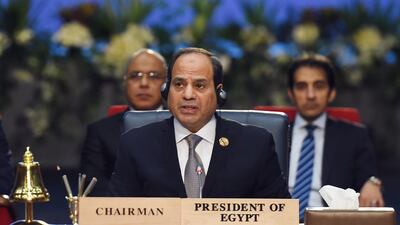Egypt’s president on Sunday acknowledged that security forces had made mistakes during one of the bloodiest episodes of the 2011 post-uprising protests, but suggested that the blame for the deaths of more than 40 demonstrators then was the work of the Muslim Brotherhood.
The clashes in November 2011 took place on Mohammed Mahmoud street off Cairo’s Tahrir Square, the birthplace of the January 25-February 11, 2011 uprising, and (at the time) home to the heavily fortified Interior Ministry, which oversees the police. The clashes followed the break-up by police of a sit-in protest by the families of protesters killed during the 18-day uprising.
The clashes, according to activists, featured the use of excessive force by police and the deployment of snipers. Among the demands of the protesters then was the removal of the Supreme Council of the Armed Forces, the body that ruled Egypt for about 17 months after Egypt’s longtime President Hosni Mubarak was forced from office.
Speaking in a televised ceremony marking the “Day of the Martyr” on Sunday, general-turned-president Abdel Fattah El Sisi offered a narrative that placed the blame for the killings on the Brotherhood, whose stalwart Mohammed Morsi was elected president in 2012. A year later, Mr El Sisi, then defence minister, led the military’s removal of Morsi amid mass protests against his divisive rule.
“We were very, very careful then, as we are at all times, that no Egyptian falls … we never touched a single Egyptian at that time,” he said, explaining that every time “elements” approached the Interior Ministry over six successive days, protesters were killed. He did not identify those elements, but later comments made clear that he was referring to the Brotherhood, which has been outlawed several times since 1948.
“For many years, maybe 40, 50 or 60 years, we have felt that some people in our midst are doubting everything, except what they believe in. Well, that has nothing at all to do with honesty, truth or religion,” said Mr El Sisi in a thinly veiled reference to the Brotherhood.
He said the grand scheme had been to bring down the state by building a perception that the killing of protesters was done in the name of the military, and subsequently whip up popular sentiment against the armed forces.
“Mistakes [by security forces] were made, without a doubt, but there was a meticulously thought out scheme for that perception to emerge and the state to fall,” said Mr El Sisi, who did not specify where or how the security forces went wrong.
He has since 2013 tirelessly warned that Egyptians must be careful not to allow their country to plunge into the strife or chaos ripping apart other nations in the region.
Addressing Egyptians, he said: “My concern for you is not about outside [threats], but the ones from the inside.”
Egypt has, since the ouster of Morsi, seen its largest crackdown on government critics in living memory, with authorities jailing thousands of the Islamist leader’s supporters, tightly controlling the media and rolling back the freedoms won by the 2011 uprising.
Faced with criticism over his government’s human rights record, Mr El Sisi has been advocating a broader notion of rights that goes beyond freedoms, arguing that the right to medical care, jobs and appropriate housing is just as important.
Last year, he labelled the 2011 uprising as the wrong remedy for a misdiagnosed issue and, without saying so explicitly, appeared to vow he would never allow a repeat of the events of 2011.
He, however, distanced himself from claims by pro-government media that the uprising was a foreign conspiracy.
Separately, Mr El Sisi on Sunday nominated a general and a close aide to replace the transport minister who resigned on February 27 just hours after an engine train car slammed into platform barriers at Cairo’s main railway station, causing a blast and a fire that killed at least 22 and injured scores.
Kamel Al Wazir, a career army officer, has led the military’s giant engineering arm that has been in charge of the mega infrastructure projects undertaken under Mr El Sisi. These include a new capital east of Cairo along with about a dozen other cities and a large network of roads and bridges.
Lt Gen Al Wazir’s nomination must be confirmed by parliament – a foregone conclusion given the overwhelming majority enjoyed by Mr El Sisi’s supporters in the house. His nomination is the latest in a string of military officials moving into civilian administration, particularly economic sectors, under Mr El Sisi.
Parliament is currently debating constitutional amendments that would potentially allow Mr El Sisi, who won a second, four-year term last year, to stay in power until 2034. It would also enshrine a political role for the military as the protector of the “constitution and democracy.”


